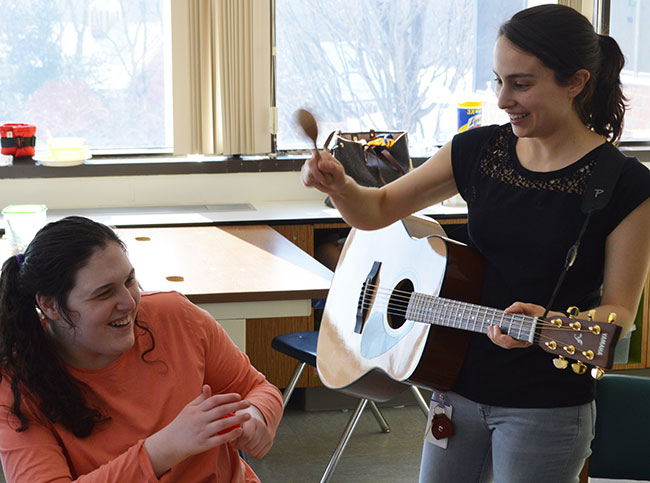Supporting our students
Guild School clinicians are committed to using Positive Behavior Interventions and Supports (PBIS), Trauma Informed Care (TIC) frameworks, and associated interventions to develop treatment plans and design interventions to support students.
-
Students and families
Mental health counselors are responsible for providing therapeutic and supportive services to students and their families. Central to this work is a comprehensive treatment plan that includes information on family history and current life situations, diagnostic formulations and a trauma-informed treatment plan. Plans are created upon admission into The Guild and updated at the time of each student’s annual review meeting for their Individual Education Plan (IEP).
The team of counselors, including expressive therapists, social workers and mental health counselors, provides individual and group counseling sessions as well as milieu-based support and consultation to the educational and residential teams.
Mental health services at The Guild are strengths-based and trauma informed in order to help students learn more about themselves. Therapy includes self-regulation and executive function skill building and practice as well as self and identity work. Using a range of modalities allows us to account for the diverse developmental, cognitive, physical and emotional needs (strengths and deficits) of the students. These modalities include interventions from expressive art therapies, play therapy, group therapy, family systems work and trauma-informed frameworks. These services can occur in the classroom, a dedicated counseling space, community locations or a residential home.
-
Quality of life
The Guild’s comprehensive treatment plans inform individual and group counseling services. When appropriate, counseling goals may be identified by a student’s educational team and included in a student’s Individual Education Plan (IEP). The objectives for these goals relate to eight established domains of quality of life: emotional well-being, interpersonal relations, material well-being, professional development, physical well-being, self-determination, social inclusion and rights.
-
Trauma-Informed Care (TIC)
Trauma-Informed Care (TIC) is an organizational structure and treatment framework that involves understanding, recognizing and responding to the effects of all types of trauma. TIC emphasizes physical, psychological and emotional safety for both individuals served and providers of care.
The Attachment, Regulation and Competency (ARC) model is a framework for intervention that supports TIC. Created to be used across child- and family-serving settings, ARC identifies three core domains for intervention: Attachment, Regulation and Competency. In this model, Attachment focuses on strengthening the caregiving system by enhancing supports, skills and resources for caregivers. Regulation focuses on increasing awareness and ability to understand, tolerate and manage internal/external experiences. Competency focuses on key factors associated with resilience, including increasing opportunities for choice and empowerment, identifying a range of aspects of self-identity, and building a narrative around key life experiences.
-
Positive Behavior Interventions and Supports (PBIS)
Positive Behavior Interventions and Supports (PBIS) is a tiered implementation framework for maximizing the selection and use of evidence-based prevention and intervention practices that support the academic, social, emotional and behavioral competence of all students.


